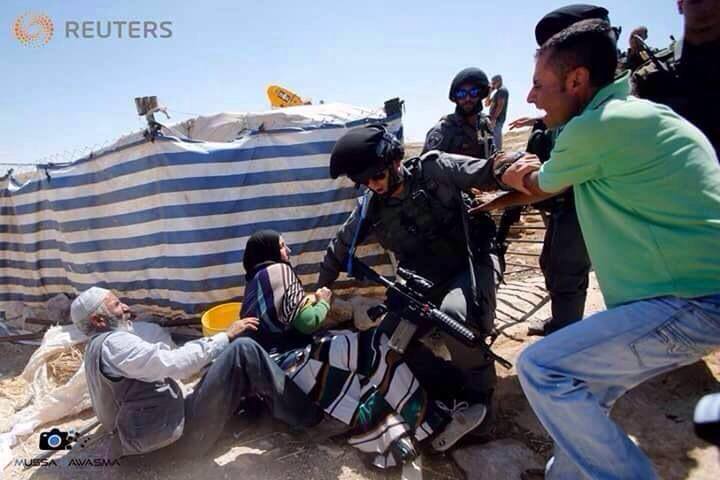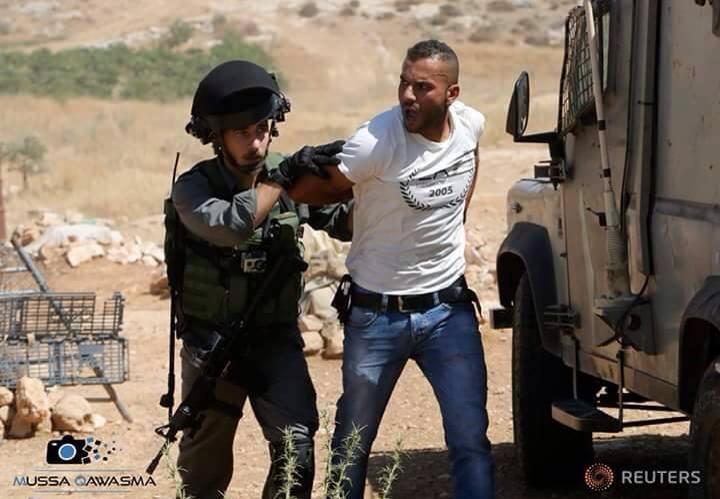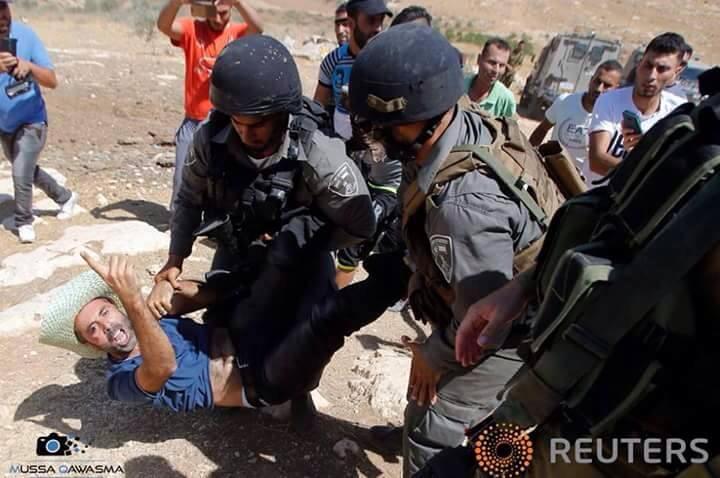29, June 2016.Israel carries forward its ethnic cleansing and displacement policies, by targeting Palestinian communities in the South Hebron Hills. New demolitions in the village of Wadi Jheish, led to the destruction of two houses, leaving two families, comprised by 20 people, homeless. Those who tried to remain in the house to prevent the demolition, were harshly beaten and four people were arrested. It is the second time in two years that the large scale demolitions in the village are carried out. The area of the village close to Susiya was declared archaeological site in 1986, long after the community was established, and has since been targeted with demolitions relentlessly by the Israeli military. Settler violence is a daily routine. Making their permanence there unfeasible creates conditions to finally expel the community and colonize the area with Israeli settlers.
In the morning of June 19 th , on the 13 th day of Ramadan, the Israeli military, the Israeli border police and the Israeli Civil Administration, entered and destroyed two houses as well as tents and a well in the village of Wadi Jheish, in the South Hebron Hills. The Israeli military entered the village and violently attacked those trying to prevent their houses from being demolished. The demolitions make mockery of the Israeli announcement to downsize demolitions during Ramadan. Moreover, the increased temperature in the past days makes the destruction more violent, considering people are fasting for the whole day. The families
there were not able to do Iftar – the meal people have after one day of fasting – and then were left unable to eat for more than 24 hours. People from surrounding villages and solidarity activists went and tried to impede the demolition. The Israeli military that protected the demolitions carried out under the order of the Israeli Civil Administration, reacted harshly and violently – as can be see here.
They will spend the next weeks sleeping in 20 in a tent provided by local activists, until they will start rebuilding their houses. Currently, they have to buy the water they need in surrounding villages and are left without electricity, since all their batteries and generators have been smashed up. The area, where Wadi Jheish is located, has been targeted for annexation since 1986. That year, the Israeli Civil Administration declared it an archaeological site under the pretext of the presence an ancient synagogue and expelled the Palestinian Bedouin community living there. Meanwhile, an Israeli religious settlement was established bearing the same name. People from Susiya have been rebuilding and facing destruction of their village since then. Expelling people from the area is a strategic aim within Israeli policy of Bantustanization of Palestine as it is key to slowly seize the area of South Hebron Hills and colonize it. The expulsion of the Palestinian population is not necessarily implemented directly. The strategy of expulsion is mainly based on rendering life unfeasible through violence, carried out both by settlers and the army, through cutting off water supplies and occupying the lands on which the community bases its survival and, through home demolitions.

Settler violence is a daily event. Sometimes settlers approach the villages and start insulting women and children. At other times, they start throwing objects at the people, putting the community’s physical safety at risk. Settlers annex the lands belonging to the Palestinian Bedouin of the area and destroy their houses. This all makes it impossible for the community to gain their livelihood and to maintain a decent life. As reported earlier this month, Susiya is just one example of the Israeli policies of displacement. After a long legal itinerary, in 2014 the residents of the village submitted a petition to the Israeli Supreme Court for an interim order to freeze the demolition orders against the village. In May 2015, the court rejected the motion for an interim order, agreeing on the possibility to move Susiya residents in the near village of Yatta, in what has been classified under the Oslo Agreement as Area A. The judge's decision threfore has legalised the demolitions in the village. It also legalizes the forced transfer of protected persons in an occupied territory – a forbidden act under international law. Susiya, of course, is among those villages trapped in the permit system, that ensures that Palestinians cannot obtain construction permits and have no choice but to live in temporary dwellings. These are considered illegal by Israeli Civil administration, and often demolished.

Demolitions throughout 2016 have already doubled the number of demolition of the whole 2015. More than 600 houses have been demolished or have received demolition orders. This data testifies an acceleration in Israeli ethnic cleansing policies and aims.
For more about Israeli violence during Ramadan, click here and here.

